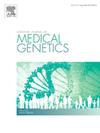De novo variants in UPF1 associated with intellectual disabilities: Human genetic and functional evidences using Drosophila model
IF 1.7
4区 医学
Q3 GENETICS & HEREDITY
引用次数: 0
Abstract
Nonsense-mediated mRNA decay represents a biologic clearing system against aberrant mRNAs harboring nonsense and frameshift mutations and depends on three factors, UPF1, UPF2, and UPF3 (UPF3A, UPF3B). While germline pathogenic variants of UPF3B and UPF2 are known to be associated with neurodevelopmental disorders, germline variants in UPF1 have not been reported, until date, as being associated with any human disorders. Herein, we report two unrelated patients with de novo UPF1 variants. Patient 1 was a 5-year-old girl with intellectual disabilities, frontal bossing, hypertelorism, high frontal hairline, and thin upper lip. Patient 2 was a 2-year-old female child with intellectual disabilities and similar features. Trio exome analysis revealed a de novo heterozygous variant in UPF1 in both the patients (Patient 1: NM_002911.4): c.949_951del, p.(Asp317del); Patient 2: c.1984G>A, p.(Asp662Asn)). We conducted experiments using Drosophila models to evaluate the functional relevance of these UPF1 variants. Enforced expression of the wild-type Upf1 allele under the control of the pan-neuronal nSyb-GAL4 driver caused mortality, mostly at the pupal stage, but still yielded adult flies. By contrast, expression of the Asp294del (Asp317del in humans) variant caused embryonic or early larval lethality and that of the Asp643Asn (Asp662Asn in humans) caused third instar larval lethality; neither produced pupa nor adult fly. Thus, the developmental defects caused by the variants, especially Asp294del, were more severe than those caused by the wild-type allele. These observations suggest that both variants are deleterious mutations. In conclusion, germline variants in UPF1 are associated with intellectual disabilities in humans.
与智障有关的 UPF1 新变异:使用果蝇模型的人类遗传和功能证据
无义介导的mRNA衰变是一种生物清除系统,可清除携带无义和缺框突变的异常mRNA,它取决于三个因子,即UPF1、UPF2和UPF3(UPF3A、UPF3B)。众所周知,UPF3B和UPF2的种系致病变体与神经发育障碍有关,但迄今为止,UPF1的种系变体尚未被报道与任何人类疾病有关。在此,我们报告了两名无亲属关系的UPF1变异患者。患者1是一名5岁女孩,患有智力障碍、额部隆起、前额发际线高和上唇薄。患者2是一名2岁的女性儿童,有智力障碍和类似的特征。三重外显子组分析显示,这两名患者的UPF1都存在一个新发杂合变异(患者1:NM_002911.4):c.949_951del,p. (Asp317del);患者2:c.1984G>A,p. (Asp662Asn))。我们利用果蝇模型进行了实验,以评估这些 UPF1 变体的功能相关性。在泛神经元 nSyb-GAL4 驱动程序的控制下,强制表达野生型 Upf1 等位基因会导致死亡,主要是在蛹期,但仍能产生成虫。相比之下,Asp294del(人类为 Asp317del)变体的表达会导致胚胎或幼虫早期死亡,而 Asp643Asn(人类为 Asp662Asn)变体的表达会导致三龄幼虫死亡;两者都不会产生蛹或成蝇。因此,变体(尤其是 Asp294del)造成的发育缺陷比野生型等位基因造成的缺陷更为严重。这些观察结果表明,这两个变体都是有害突变。总之,UPF1的种系变异与人类的智力障碍有关。
本文章由计算机程序翻译,如有差异,请以英文原文为准。
求助全文
约1分钟内获得全文
求助全文
来源期刊
CiteScore
4.10
自引率
0.00%
发文量
193
审稿时长
66 days
期刊介绍:
The European Journal of Medical Genetics (EJMG) is a peer-reviewed journal that publishes articles in English on various aspects of human and medical genetics and of the genetics of experimental models.
Original clinical and experimental research articles, short clinical reports, review articles and letters to the editor are welcome on topics such as :
• Dysmorphology and syndrome delineation
• Molecular genetics and molecular cytogenetics of inherited disorders
• Clinical applications of genomics and nextgen sequencing technologies
• Syndromal cancer genetics
• Behavioral genetics
• Community genetics
• Fetal pathology and prenatal diagnosis
• Genetic counseling.

 求助内容:
求助内容: 应助结果提醒方式:
应助结果提醒方式:


